Business Economics: Does Ending Gender Pay Inequality Require a Transformation of the Economic Purpose of Business in Society?
VerifiedAdded on 2023/06/11
|8
|1931
|444
AI Summary
This article explores the debate on whether ending gender pay inequality requires a transformation of the economic purpose of business in society. It discusses the economic benefits of closing the gender gap and the need for government intervention. The article highlights the challenges faced by women in managing household and business responsibilities and suggests solutions such as equal and appreciable scale of remuneration, free childcare services, and parental leaves for men.
Contribute Materials
Your contribution can guide someone’s learning journey. Share your
documents today.
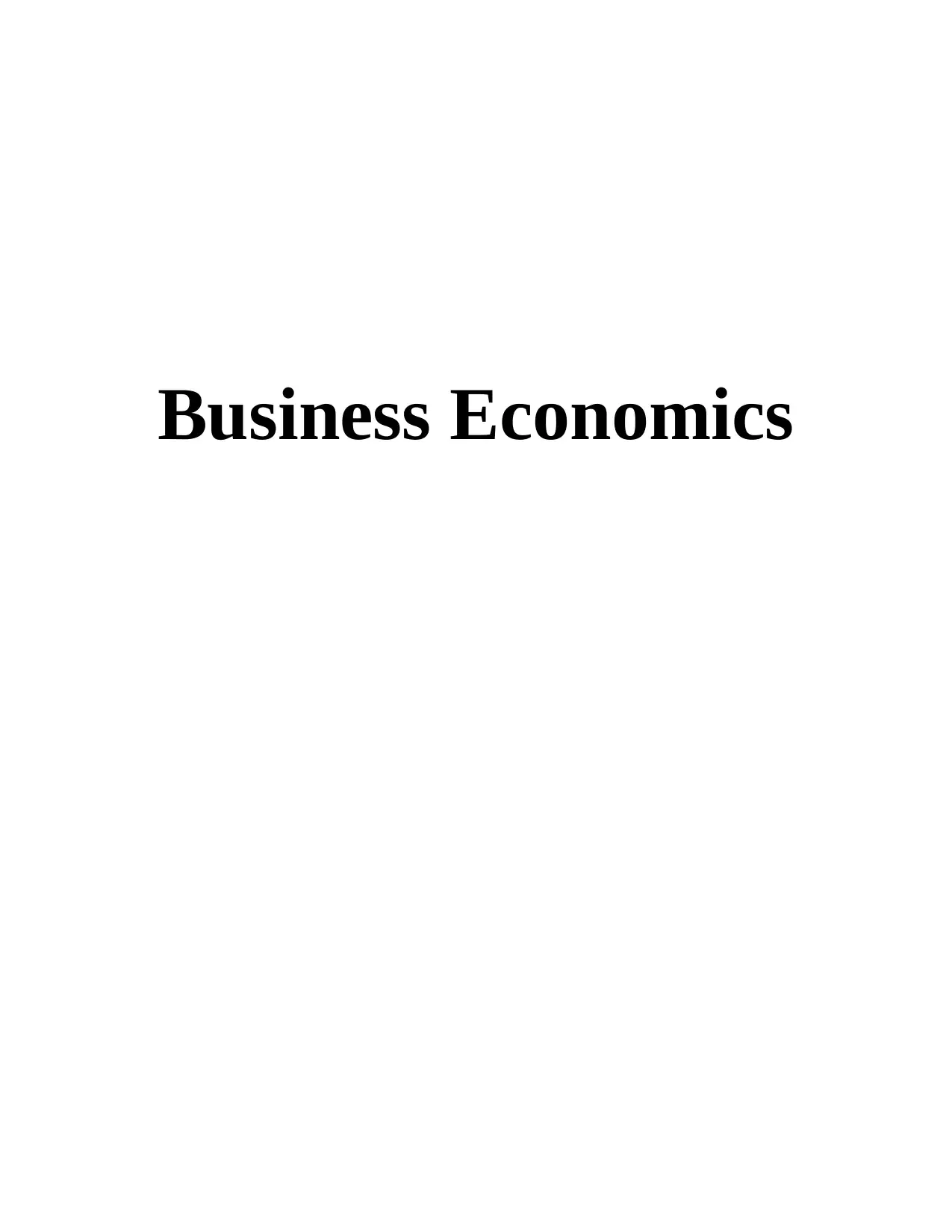
Business Economics
Secure Best Marks with AI Grader
Need help grading? Try our AI Grader for instant feedback on your assignments.
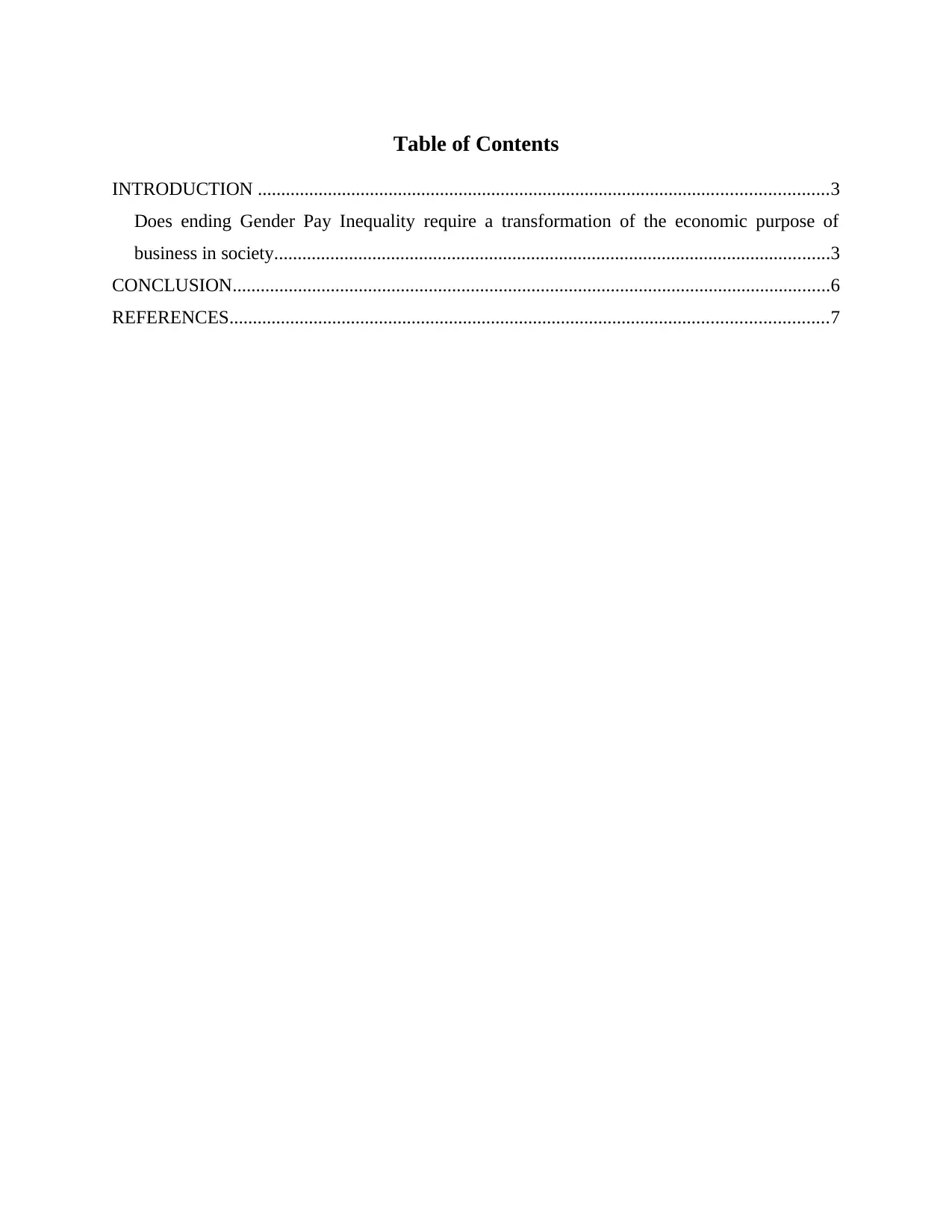
Table of Contents
INTRODUCTION ..........................................................................................................................3
Does ending Gender Pay Inequality require a transformation of the economic purpose of
business in society.......................................................................................................................3
CONCLUSION................................................................................................................................6
REFERENCES................................................................................................................................7
INTRODUCTION ..........................................................................................................................3
Does ending Gender Pay Inequality require a transformation of the economic purpose of
business in society.......................................................................................................................3
CONCLUSION................................................................................................................................6
REFERENCES................................................................................................................................7
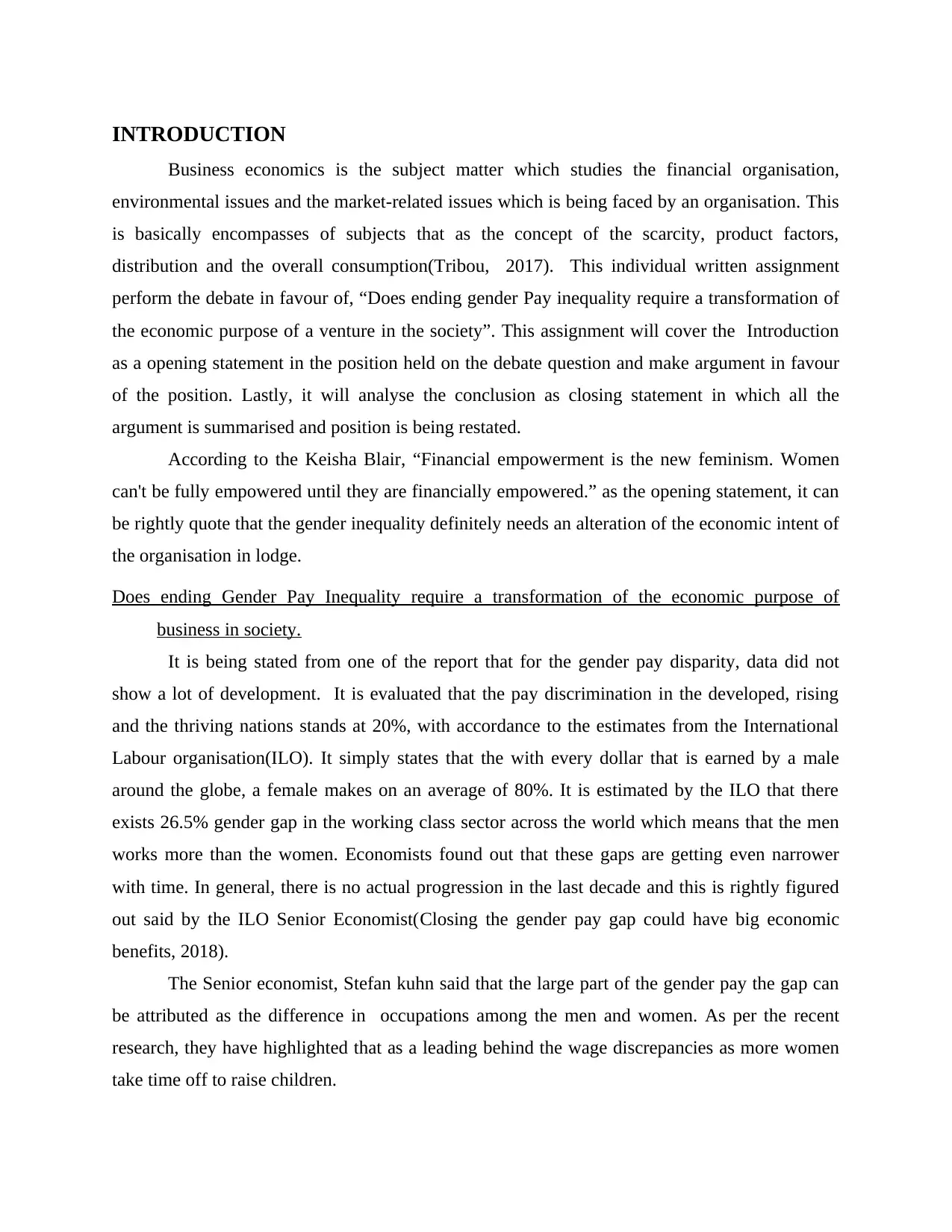
INTRODUCTION
Business economics is the subject matter which studies the financial organisation,
environmental issues and the market-related issues which is being faced by an organisation. This
is basically encompasses of subjects that as the concept of the scarcity, product factors,
distribution and the overall consumption(Tribou, 2017). This individual written assignment
perform the debate in favour of, “Does ending gender Pay inequality require a transformation of
the economic purpose of a venture in the society”. This assignment will cover the Introduction
as a opening statement in the position held on the debate question and make argument in favour
of the position. Lastly, it will analyse the conclusion as closing statement in which all the
argument is summarised and position is being restated.
According to the Keisha Blair, “Financial empowerment is the new feminism. Women
can't be fully empowered until they are financially empowered.” as the opening statement, it can
be rightly quote that the gender inequality definitely needs an alteration of the economic intent of
the organisation in lodge.
Does ending Gender Pay Inequality require a transformation of the economic purpose of
business in society.
It is being stated from one of the report that for the gender pay disparity, data did not
show a lot of development. It is evaluated that the pay discrimination in the developed, rising
and the thriving nations stands at 20%, with accordance to the estimates from the International
Labour organisation(ILO). It simply states that the with every dollar that is earned by a male
around the globe, a female makes on an average of 80%. It is estimated by the ILO that there
exists 26.5% gender gap in the working class sector across the world which means that the men
works more than the women. Economists found out that these gaps are getting even narrower
with time. In general, there is no actual progression in the last decade and this is rightly figured
out said by the ILO Senior Economist(Closing the gender pay gap could have big economic
benefits, 2018).
The Senior economist, Stefan kuhn said that the large part of the gender pay the gap can
be attributed as the difference in occupations among the men and women. As per the recent
research, they have highlighted that as a leading behind the wage discrepancies as more women
take time off to raise children.
Business economics is the subject matter which studies the financial organisation,
environmental issues and the market-related issues which is being faced by an organisation. This
is basically encompasses of subjects that as the concept of the scarcity, product factors,
distribution and the overall consumption(Tribou, 2017). This individual written assignment
perform the debate in favour of, “Does ending gender Pay inequality require a transformation of
the economic purpose of a venture in the society”. This assignment will cover the Introduction
as a opening statement in the position held on the debate question and make argument in favour
of the position. Lastly, it will analyse the conclusion as closing statement in which all the
argument is summarised and position is being restated.
According to the Keisha Blair, “Financial empowerment is the new feminism. Women
can't be fully empowered until they are financially empowered.” as the opening statement, it can
be rightly quote that the gender inequality definitely needs an alteration of the economic intent of
the organisation in lodge.
Does ending Gender Pay Inequality require a transformation of the economic purpose of
business in society.
It is being stated from one of the report that for the gender pay disparity, data did not
show a lot of development. It is evaluated that the pay discrimination in the developed, rising
and the thriving nations stands at 20%, with accordance to the estimates from the International
Labour organisation(ILO). It simply states that the with every dollar that is earned by a male
around the globe, a female makes on an average of 80%. It is estimated by the ILO that there
exists 26.5% gender gap in the working class sector across the world which means that the men
works more than the women. Economists found out that these gaps are getting even narrower
with time. In general, there is no actual progression in the last decade and this is rightly figured
out said by the ILO Senior Economist(Closing the gender pay gap could have big economic
benefits, 2018).
The Senior economist, Stefan kuhn said that the large part of the gender pay the gap can
be attributed as the difference in occupations among the men and women. As per the recent
research, they have highlighted that as a leading behind the wage discrepancies as more women
take time off to raise children.
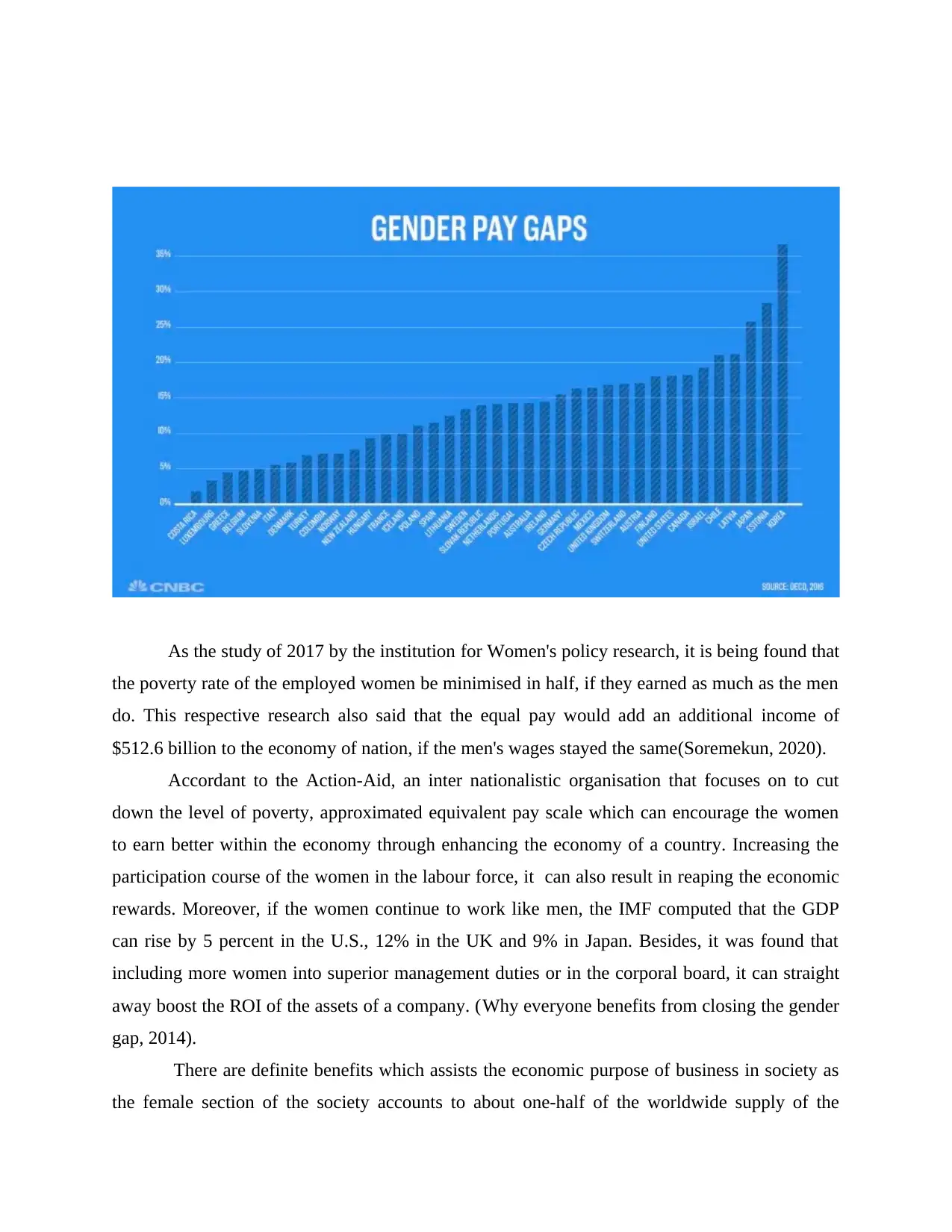
As the study of 2017 by the institution for Women's policy research, it is being found that
the poverty rate of the employed women be minimised in half, if they earned as much as the men
do. This respective research also said that the equal pay would add an additional income of
$512.6 billion to the economy of nation, if the men's wages stayed the same(Soremekun, 2020).
Accordant to the Action-Aid, an inter nationalistic organisation that focuses on to cut
down the level of poverty, approximated equivalent pay scale which can encourage the women
to earn better within the economy through enhancing the economy of a country. Increasing the
participation course of the women in the labour force, it can also result in reaping the economic
rewards. Moreover, if the women continue to work like men, the IMF computed that the GDP
can rise by 5 percent in the U.S., 12% in the UK and 9% in Japan. Besides, it was found that
including more women into superior management duties or in the corporal board, it can straight
away boost the ROI of the assets of a company. (Why everyone benefits from closing the gender
gap, 2014).
There are definite benefits which assists the economic purpose of business in society as
the female section of the society accounts to about one-half of the worldwide supply of the
the poverty rate of the employed women be minimised in half, if they earned as much as the men
do. This respective research also said that the equal pay would add an additional income of
$512.6 billion to the economy of nation, if the men's wages stayed the same(Soremekun, 2020).
Accordant to the Action-Aid, an inter nationalistic organisation that focuses on to cut
down the level of poverty, approximated equivalent pay scale which can encourage the women
to earn better within the economy through enhancing the economy of a country. Increasing the
participation course of the women in the labour force, it can also result in reaping the economic
rewards. Moreover, if the women continue to work like men, the IMF computed that the GDP
can rise by 5 percent in the U.S., 12% in the UK and 9% in Japan. Besides, it was found that
including more women into superior management duties or in the corporal board, it can straight
away boost the ROI of the assets of a company. (Why everyone benefits from closing the gender
gap, 2014).
There are definite benefits which assists the economic purpose of business in society as
the female section of the society accounts to about one-half of the worldwide supply of the
Secure Best Marks with AI Grader
Need help grading? Try our AI Grader for instant feedback on your assignments.
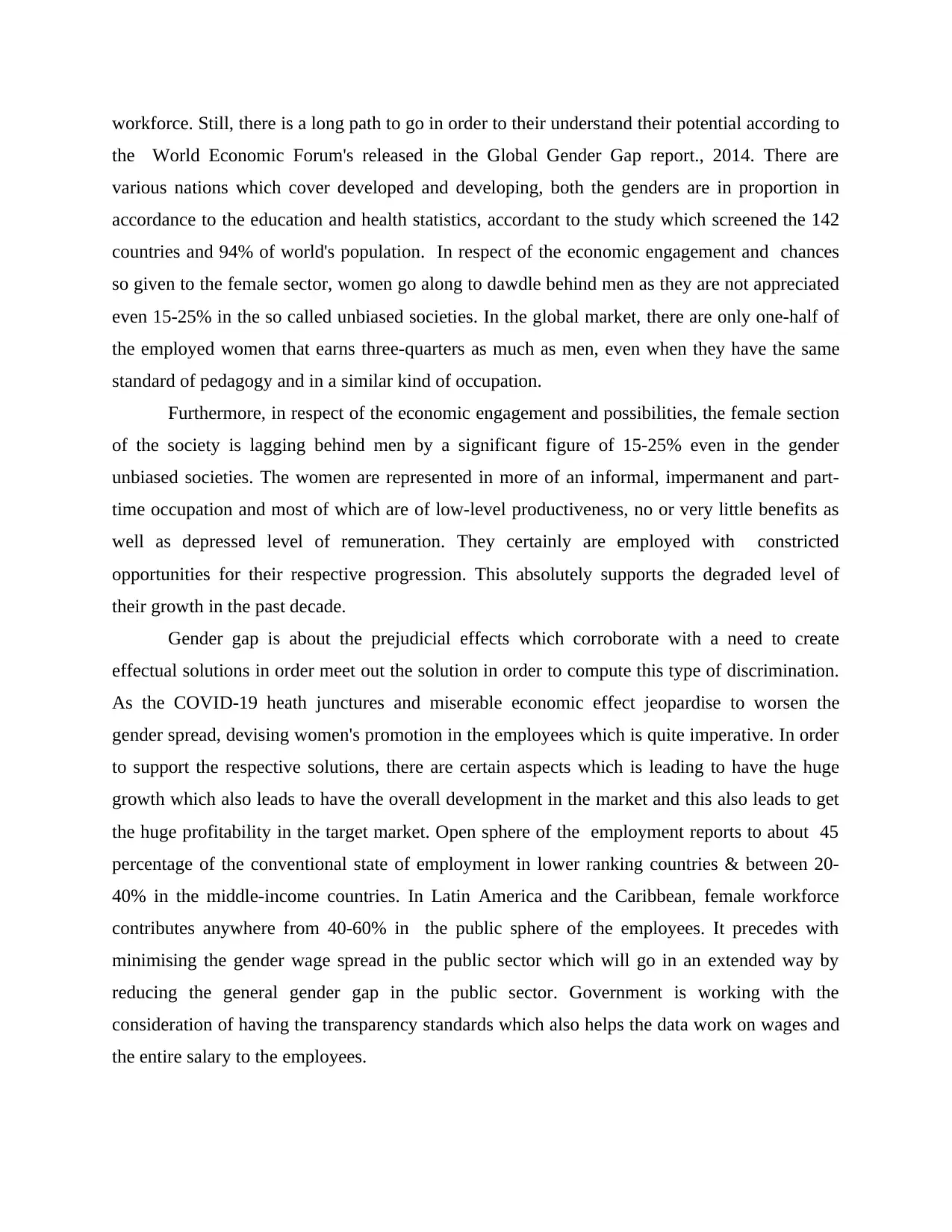
workforce. Still, there is a long path to go in order to their understand their potential according to
the World Economic Forum's released in the Global Gender Gap report., 2014. There are
various nations which cover developed and developing, both the genders are in proportion in
accordance to the education and health statistics, accordant to the study which screened the 142
countries and 94% of world's population. In respect of the economic engagement and chances
so given to the female sector, women go along to dawdle behind men as they are not appreciated
even 15-25% in the so called unbiased societies. In the global market, there are only one-half of
the employed women that earns three-quarters as much as men, even when they have the same
standard of pedagogy and in a similar kind of occupation.
Furthermore, in respect of the economic engagement and possibilities, the female section
of the society is lagging behind men by a significant figure of 15-25% even in the gender
unbiased societies. The women are represented in more of an informal, impermanent and part-
time occupation and most of which are of low-level productiveness, no or very little benefits as
well as depressed level of remuneration. They certainly are employed with constricted
opportunities for their respective progression. This absolutely supports the degraded level of
their growth in the past decade.
Gender gap is about the prejudicial effects which corroborate with a need to create
effectual solutions in order meet out the solution in order to compute this type of discrimination.
As the COVID-19 heath junctures and miserable economic effect jeopardise to worsen the
gender spread, devising women's promotion in the employees which is quite imperative. In order
to support the respective solutions, there are certain aspects which is leading to have the huge
growth which also leads to have the overall development in the market and this also leads to get
the huge profitability in the target market. Open sphere of the employment reports to about 45
percentage of the conventional state of employment in lower ranking countries & between 20-
40% in the middle-income countries. In Latin America and the Caribbean, female workforce
contributes anywhere from 40-60% in the public sphere of the employees. It precedes with
minimising the gender wage spread in the public sector which will go in an extended way by
reducing the general gender gap in the public sector. Government is working with the
consideration of having the transparency standards which also helps the data work on wages and
the entire salary to the employees.
the World Economic Forum's released in the Global Gender Gap report., 2014. There are
various nations which cover developed and developing, both the genders are in proportion in
accordance to the education and health statistics, accordant to the study which screened the 142
countries and 94% of world's population. In respect of the economic engagement and chances
so given to the female sector, women go along to dawdle behind men as they are not appreciated
even 15-25% in the so called unbiased societies. In the global market, there are only one-half of
the employed women that earns three-quarters as much as men, even when they have the same
standard of pedagogy and in a similar kind of occupation.
Furthermore, in respect of the economic engagement and possibilities, the female section
of the society is lagging behind men by a significant figure of 15-25% even in the gender
unbiased societies. The women are represented in more of an informal, impermanent and part-
time occupation and most of which are of low-level productiveness, no or very little benefits as
well as depressed level of remuneration. They certainly are employed with constricted
opportunities for their respective progression. This absolutely supports the degraded level of
their growth in the past decade.
Gender gap is about the prejudicial effects which corroborate with a need to create
effectual solutions in order meet out the solution in order to compute this type of discrimination.
As the COVID-19 heath junctures and miserable economic effect jeopardise to worsen the
gender spread, devising women's promotion in the employees which is quite imperative. In order
to support the respective solutions, there are certain aspects which is leading to have the huge
growth which also leads to have the overall development in the market and this also leads to get
the huge profitability in the target market. Open sphere of the employment reports to about 45
percentage of the conventional state of employment in lower ranking countries & between 20-
40% in the middle-income countries. In Latin America and the Caribbean, female workforce
contributes anywhere from 40-60% in the public sphere of the employees. It precedes with
minimising the gender wage spread in the public sector which will go in an extended way by
reducing the general gender gap in the public sector. Government is working with the
consideration of having the transparency standards which also helps the data work on wages and
the entire salary to the employees.
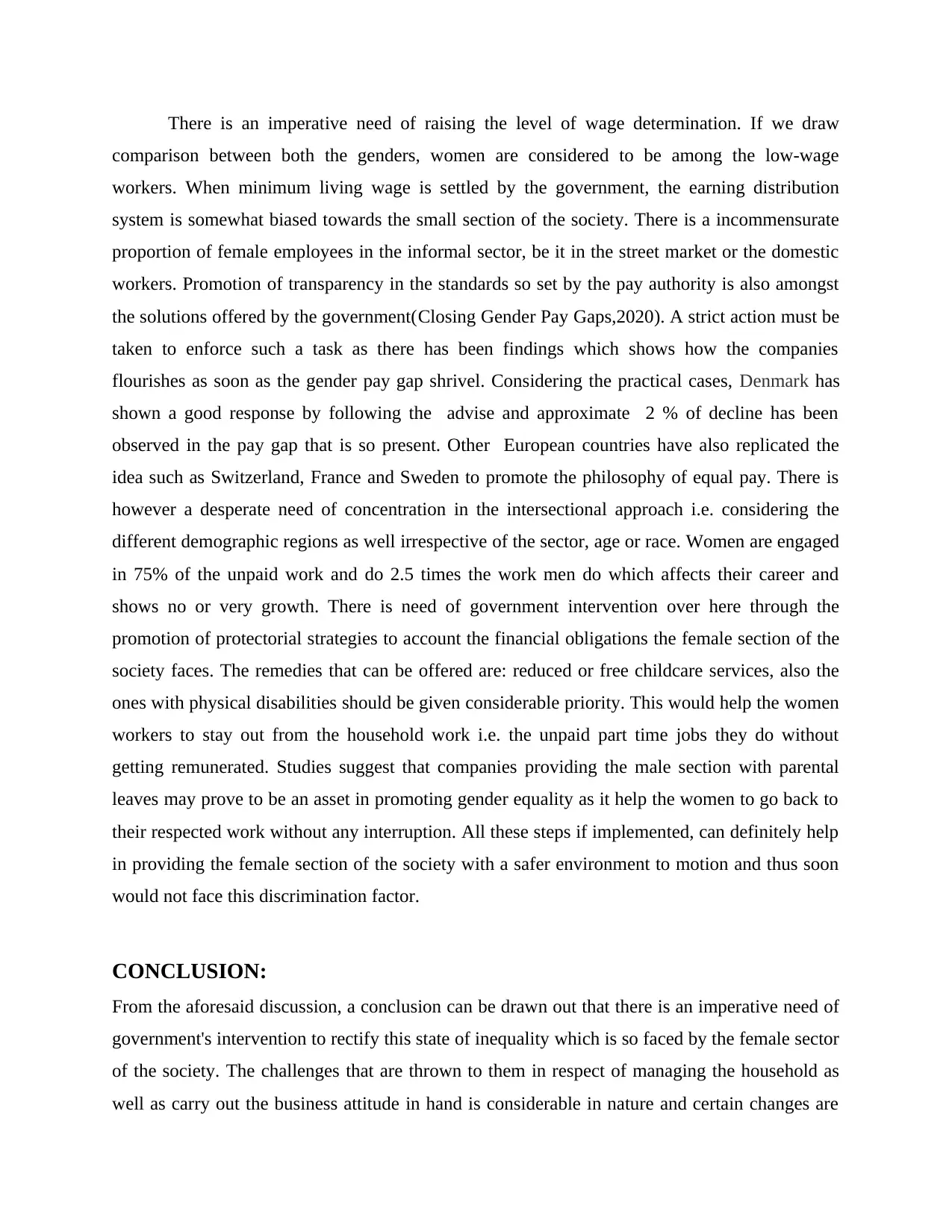
There is an imperative need of raising the level of wage determination. If we draw
comparison between both the genders, women are considered to be among the low-wage
workers. When minimum living wage is settled by the government, the earning distribution
system is somewhat biased towards the small section of the society. There is a incommensurate
proportion of female employees in the informal sector, be it in the street market or the domestic
workers. Promotion of transparency in the standards so set by the pay authority is also amongst
the solutions offered by the government(Closing Gender Pay Gaps,2020). A strict action must be
taken to enforce such a task as there has been findings which shows how the companies
flourishes as soon as the gender pay gap shrivel. Considering the practical cases, Denmark has
shown a good response by following the advise and approximate 2 % of decline has been
observed in the pay gap that is so present. Other European countries have also replicated the
idea such as Switzerland, France and Sweden to promote the philosophy of equal pay. There is
however a desperate need of concentration in the intersectional approach i.e. considering the
different demographic regions as well irrespective of the sector, age or race. Women are engaged
in 75% of the unpaid work and do 2.5 times the work men do which affects their career and
shows no or very growth. There is need of government intervention over here through the
promotion of protectorial strategies to account the financial obligations the female section of the
society faces. The remedies that can be offered are: reduced or free childcare services, also the
ones with physical disabilities should be given considerable priority. This would help the women
workers to stay out from the household work i.e. the unpaid part time jobs they do without
getting remunerated. Studies suggest that companies providing the male section with parental
leaves may prove to be an asset in promoting gender equality as it help the women to go back to
their respected work without any interruption. All these steps if implemented, can definitely help
in providing the female section of the society with a safer environment to motion and thus soon
would not face this discrimination factor.
CONCLUSION:
From the aforesaid discussion, a conclusion can be drawn out that there is an imperative need of
government's intervention to rectify this state of inequality which is so faced by the female sector
of the society. The challenges that are thrown to them in respect of managing the household as
well as carry out the business attitude in hand is considerable in nature and certain changes are
comparison between both the genders, women are considered to be among the low-wage
workers. When minimum living wage is settled by the government, the earning distribution
system is somewhat biased towards the small section of the society. There is a incommensurate
proportion of female employees in the informal sector, be it in the street market or the domestic
workers. Promotion of transparency in the standards so set by the pay authority is also amongst
the solutions offered by the government(Closing Gender Pay Gaps,2020). A strict action must be
taken to enforce such a task as there has been findings which shows how the companies
flourishes as soon as the gender pay gap shrivel. Considering the practical cases, Denmark has
shown a good response by following the advise and approximate 2 % of decline has been
observed in the pay gap that is so present. Other European countries have also replicated the
idea such as Switzerland, France and Sweden to promote the philosophy of equal pay. There is
however a desperate need of concentration in the intersectional approach i.e. considering the
different demographic regions as well irrespective of the sector, age or race. Women are engaged
in 75% of the unpaid work and do 2.5 times the work men do which affects their career and
shows no or very growth. There is need of government intervention over here through the
promotion of protectorial strategies to account the financial obligations the female section of the
society faces. The remedies that can be offered are: reduced or free childcare services, also the
ones with physical disabilities should be given considerable priority. This would help the women
workers to stay out from the household work i.e. the unpaid part time jobs they do without
getting remunerated. Studies suggest that companies providing the male section with parental
leaves may prove to be an asset in promoting gender equality as it help the women to go back to
their respected work without any interruption. All these steps if implemented, can definitely help
in providing the female section of the society with a safer environment to motion and thus soon
would not face this discrimination factor.
CONCLUSION:
From the aforesaid discussion, a conclusion can be drawn out that there is an imperative need of
government's intervention to rectify this state of inequality which is so faced by the female sector
of the society. The challenges that are thrown to them in respect of managing the household as
well as carry out the business attitude in hand is considerable in nature and certain changes are
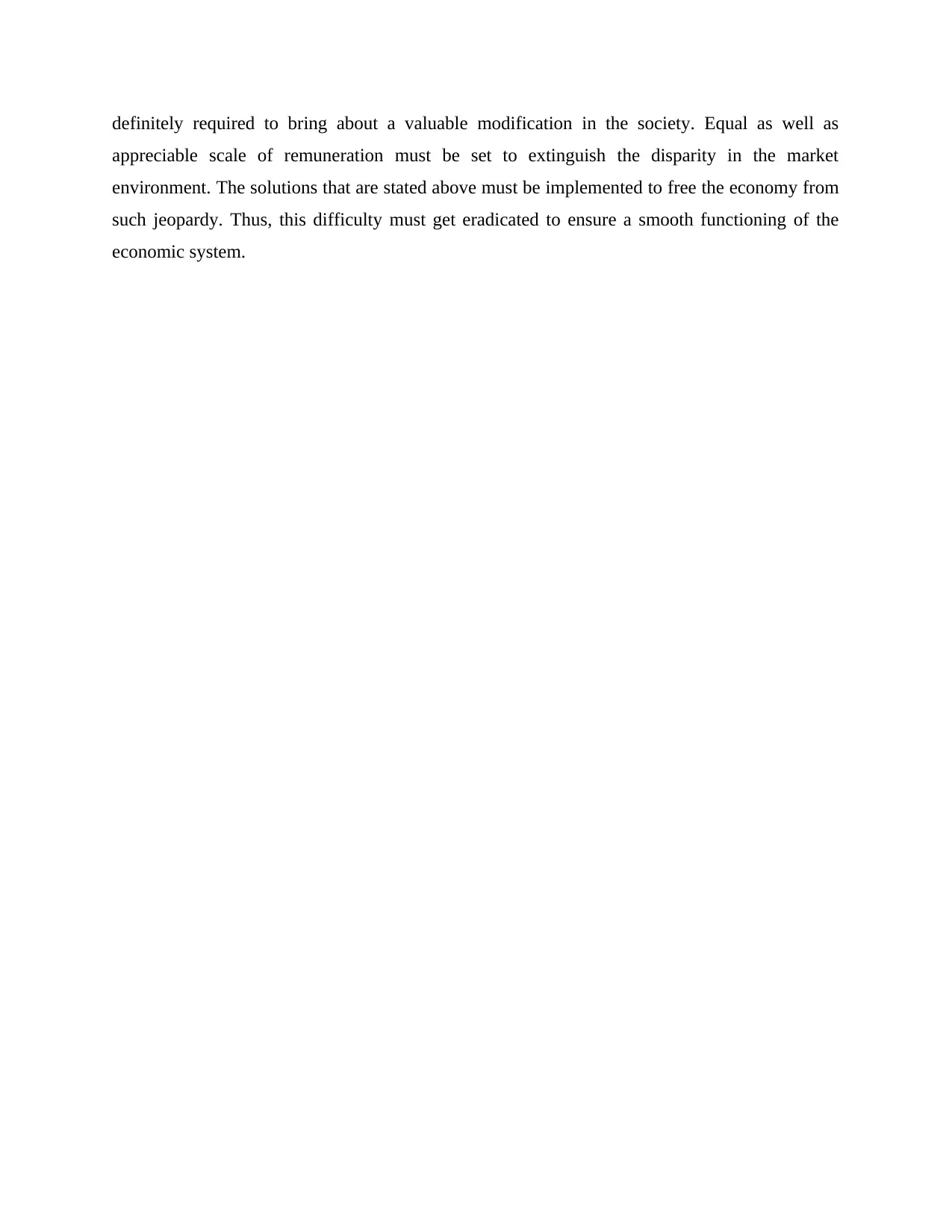
definitely required to bring about a valuable modification in the society. Equal as well as
appreciable scale of remuneration must be set to extinguish the disparity in the market
environment. The solutions that are stated above must be implemented to free the economy from
such jeopardy. Thus, this difficulty must get eradicated to ensure a smooth functioning of the
economic system.
appreciable scale of remuneration must be set to extinguish the disparity in the market
environment. The solutions that are stated above must be implemented to free the economy from
such jeopardy. Thus, this difficulty must get eradicated to ensure a smooth functioning of the
economic system.
Paraphrase This Document
Need a fresh take? Get an instant paraphrase of this document with our AI Paraphraser
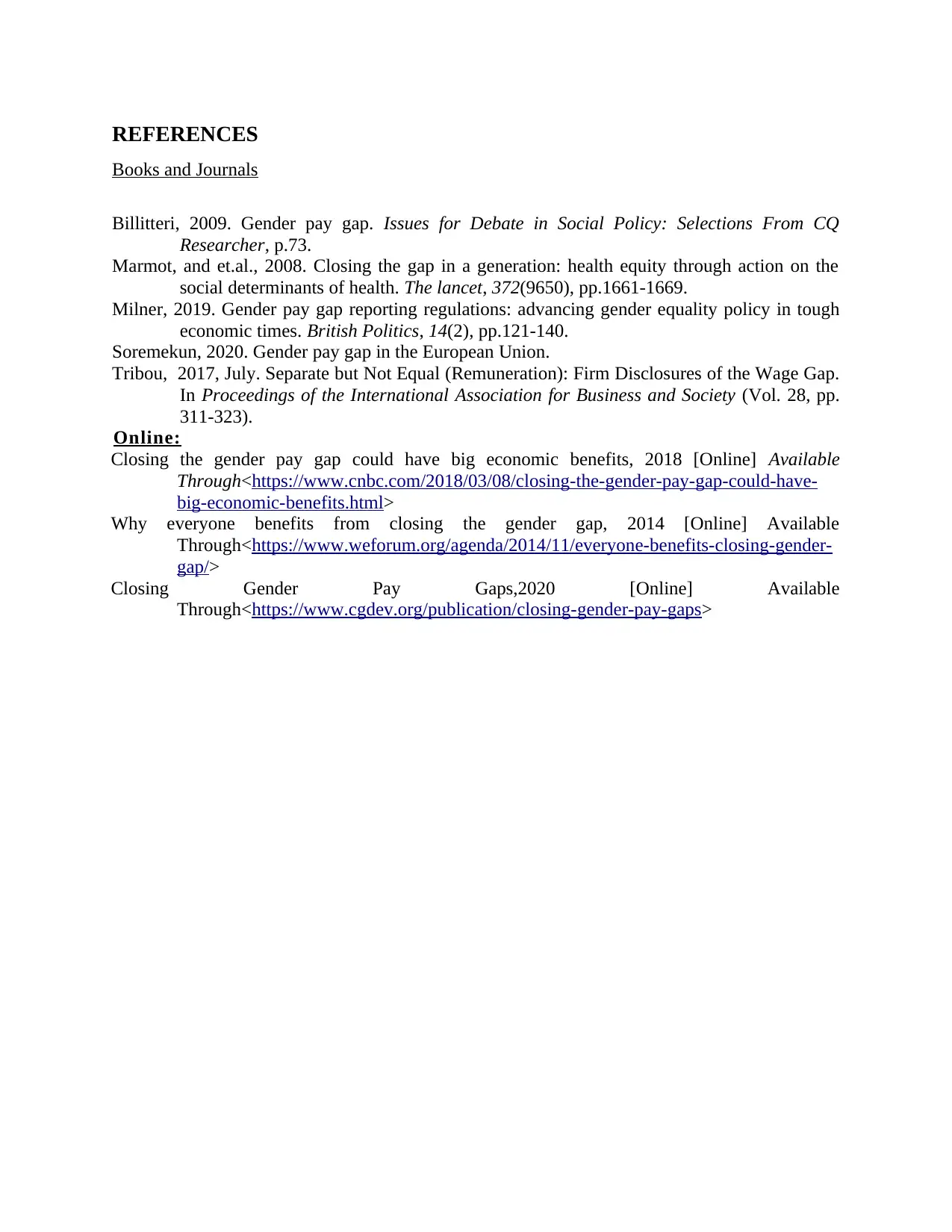
REFERENCES
Books and Journals
Billitteri, 2009. Gender pay gap. Issues for Debate in Social Policy: Selections From CQ
Researcher, p.73.
Marmot, and et.al., 2008. Closing the gap in a generation: health equity through action on the
social determinants of health. The lancet, 372(9650), pp.1661-1669.
Milner, 2019. Gender pay gap reporting regulations: advancing gender equality policy in tough
economic times. British Politics, 14(2), pp.121-140.
Soremekun, 2020. Gender pay gap in the European Union.
Tribou, 2017, July. Separate but Not Equal (Remuneration): Firm Disclosures of the Wage Gap.
In Proceedings of the International Association for Business and Society (Vol. 28, pp.
311-323).
Online:
Closing the gender pay gap could have big economic benefits, 2018 [Online] Available
Through<https://www.cnbc.com/2018/03/08/closing-the-gender-pay-gap-could-have-
big-economic-benefits.html>
Why everyone benefits from closing the gender gap, 2014 [Online] Available
Through<https://www.weforum.org/agenda/2014/11/everyone-benefits-closing-gender-
gap/>
Closing Gender Pay Gaps,2020 [Online] Available
Through<https://www.cgdev.org/publication/closing-gender-pay-gaps>
Books and Journals
Billitteri, 2009. Gender pay gap. Issues for Debate in Social Policy: Selections From CQ
Researcher, p.73.
Marmot, and et.al., 2008. Closing the gap in a generation: health equity through action on the
social determinants of health. The lancet, 372(9650), pp.1661-1669.
Milner, 2019. Gender pay gap reporting regulations: advancing gender equality policy in tough
economic times. British Politics, 14(2), pp.121-140.
Soremekun, 2020. Gender pay gap in the European Union.
Tribou, 2017, July. Separate but Not Equal (Remuneration): Firm Disclosures of the Wage Gap.
In Proceedings of the International Association for Business and Society (Vol. 28, pp.
311-323).
Online:
Closing the gender pay gap could have big economic benefits, 2018 [Online] Available
Through<https://www.cnbc.com/2018/03/08/closing-the-gender-pay-gap-could-have-
big-economic-benefits.html>
Why everyone benefits from closing the gender gap, 2014 [Online] Available
Through<https://www.weforum.org/agenda/2014/11/everyone-benefits-closing-gender-
gap/>
Closing Gender Pay Gaps,2020 [Online] Available
Through<https://www.cgdev.org/publication/closing-gender-pay-gaps>
1 out of 8
Related Documents
Your All-in-One AI-Powered Toolkit for Academic Success.
+13062052269
info@desklib.com
Available 24*7 on WhatsApp / Email
![[object Object]](/_next/static/media/star-bottom.7253800d.svg)
Unlock your academic potential
© 2024 | Zucol Services PVT LTD | All rights reserved.



